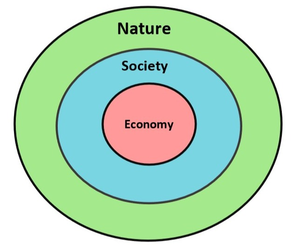Curated theme: Language, well-being, and the environment - sustainability from indigenous linguists' perspective: Difference between revisions
mNo edit summary |
|||
| Line 21: | Line 21: | ||
==== Relevant Sustainable Development Goals ==== | ==== Relevant Sustainable Development Goals ==== | ||
[[Sustainable Development Goal 3|Sustainable Development Goal 3 - Good health and well-being <br />]][[Sustainable Development Goal 10|Sustainable Development Goal 10 - Reduced inequalities]] | [[Sustainable Development Goal 3|Sustainable Development Goal 3 - Good health and well-being <br />]][[Sustainable Development Goal 10|Sustainable Development Goal 10 - Reduced inequalities]] | ||
[[Goal 13. Take urgent action to combat climate change and its impacts|Sustainable Development Goal 13 - Climate action]] | [[Goal 13. Take urgent action to combat climate change and its impacts|Sustainable Development Goal 13 - Climate action]] | ||
[[Goal 15. Protect, restore and promote sustainable use of terrestrial ecosystems, sustainably manage forests, combat desertification, and halt and reverse land degradation and halt biodiversity loss|Sustainable Development Goal 15 - Life on land]] | [[Goal 15. Protect, restore and promote sustainable use of terrestrial ecosystems, sustainably manage forests, combat desertification, and halt and reverse land degradation and halt biodiversity loss|Sustainable Development Goal 15 - Life on land]] | ||
[[Sustainable Development Goal 4|Sustainable Development Goal 4 - Quality education]] | [[Sustainable Development Goal 4|Sustainable Development Goal 4 - Quality education]] | ||
| Line 36: | Line 32: | ||
=== Ecology === | === Ecology === | ||
[[The natural ecology of language]] | |||
[[Understanding of ecology in other fields]] | [[Understanding of ecology in other fields]] | ||
| Line 43: | Line 39: | ||
[[Theory of the Organism-Environment System]] | [[Theory of the Organism-Environment System]] | ||
==== Of hierarchy and definitions ==== | ==== Of hierarchy and definitions ==== | ||
As aspects of human life, language and human well-being are both part of society. Looking at the image, environment in its narrow definition ("nature") contains all of society. Environment, if used in the ecological context, may also mean a broader living place where society is an environment for language. A broader well-being would then include the well-being of all levels; nature, society, and economy. | As aspects of human life, language and human well-being are both part of society. Looking at the image, environment in its narrow definition ("nature") contains all of society. Environment, if used in the ecological context, may also mean a broader living place where society is an environment for language. A broader well-being would then include the well-being of all levels; nature, society, and economy. | ||
[[Category:Sustainability in linguistics]] | [[Category:Sustainability in linguistics]] | ||
| Line 62: | Line 50: | ||
[[Category:Inclusion]] | [[Category:Inclusion]] | ||
[[Category:Sustainability (UN's definition)]] | [[Category:Sustainability (UN's definition)]] | ||
[[Category:Linguistic diversity]] | [[Category:Linguistic diversity]] | ||
Revision as of 04:10, 25 January 2023
This page attempts to show some examples of indigenous researchers' work in linguistics on the relation between language, well-being, and the environment. The aim is to highlight how these studies can be applied in creating and working towards a more sustainable linguistics.
What is (sustainable) linguistics?
Interdisciplinarity and types of linguistics
Sustainable linguistics (definition)
Indigenous linguist(ic)s
Traditional Ecological Knowledge
Issues related to academic involvement in language revitalization
Classifications of Language Endangerment
Problems associated with language endangerment
Relevant Sustainable Development Goals
Sustainable Development Goal 3 - Good health and well-being
Sustainable Development Goal 10 - Reduced inequalities
Sustainable Development Goal 13 - Climate action
Sustainable Development Goal 15 - Life on land
Sustainable Development Goal 4 - Quality education

Ecology
The natural ecology of language
Understanding of ecology in other fields
Theory of the Organism-Environment System
Of hierarchy and definitions
As aspects of human life, language and human well-being are both part of society. Looking at the image, environment in its narrow definition ("nature") contains all of society. Environment, if used in the ecological context, may also mean a broader living place where society is an environment for language. A broader well-being would then include the well-being of all levels; nature, society, and economy.